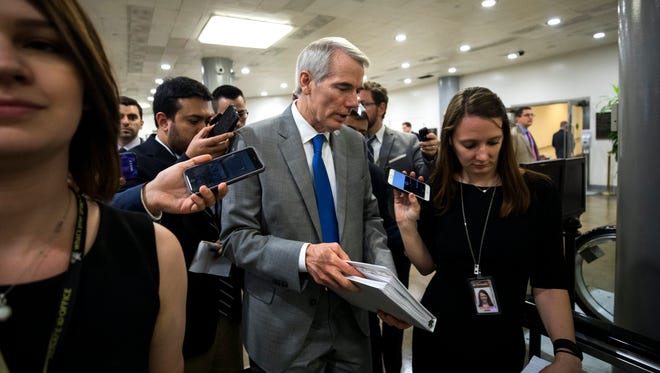White House backs off proposed cuts to anti-drug programs
WASHINGTON — The White House on Tuesday backed off a much-criticized proposal to gut the Office of National Drug Control Policy, which directs the country’s drug prevention efforts and has taken a lead in fighting the opioid epidemic.

Earlier this month, the Trump administration floated a plan to slash the ONDCP budget by 95% and eliminate two anti-drug programs — a proposal greeted with bipartisan condemnation from Congress.
In its budget released Tuesday, the White House scrapped those deep cuts in favor of much smaller trims to the ONDCP, totaling about 3%. Amid fierce lobbying from Sen. Rob Portman, R-Ohio, and others, the White House plan also calls for preserving the two targeted programs — the High Intensity Drug Trafficking Areas program and the Drug Free Communities initiative.
Portman and others applauded the reversal.
"We must continue to support these and other programs ... which are aimed at prevention, treatment and recovery services that so many Americans desperately need," he said in a statement Tuesday.
Read more:
Trump budget cuts safety net programs, hitting states that voted for him
Amid opioid epidemic, White House may cut drug control office budget
Trump administration missing mark on opioids, advocates say
Congress has the final say on spending, so the White House budget is more a statement of priorities than a legislative starting point. It's important in terms of telegraphing the Trump administration's wishes but it may have little impact on the final spending plan Congress passes for fiscal year 2018.
Overall, the president's budget would allocate about $27.8 billion for anti-drug efforts, according to White House documents. But some critics said the plan skimps on treatment and prevention programs in favor of beefing up interdiction and enforcement. Advocates said that represents a shift away from confronting addiction as a public health issue, rather than a law enforcement problem.
Trump's proposal, for example, calls for slashing current mental health programs by $235 million and cutting $73 million from existing substance abuse prevention programs, compared to 2017 funding levels. At the same time, the Department of Justice would see a $188 million increase to prosecute drug crimes and other related offenses, including $103 million “to maintain and expand capacity to fight against opioids and other illicit drugs.”
That is "the opposite of what we would want to see," said Grant Smith, deputy director of national affairs at the Drug Policy Alliance, a Washington-based advocacy group that supports treatment over incarceration for drug offenders. Smith has said he's concerned the Trump administration is reverting to a failed war-on-drugs approach.
The White House touted other funding for new treatment programs created by Congress last year, including $500 million in the White House blueprint for grants to states to reduce opioid abuse and expand addiction treatment and recovery services.
Portman said he was still sorting through all the details but acknowledged some remaining concerns about the shifting of resources.
"If you add it all up ... I do think net we’re making progress," Portman said. But, he added, "the problem's getting worse, not better."